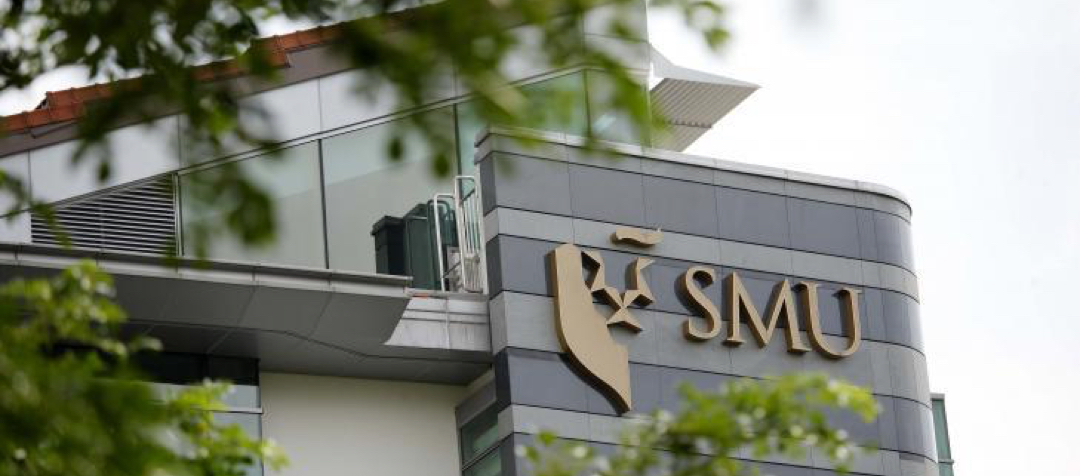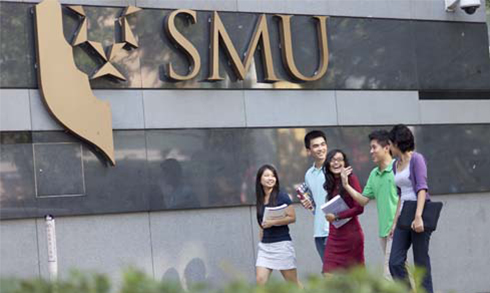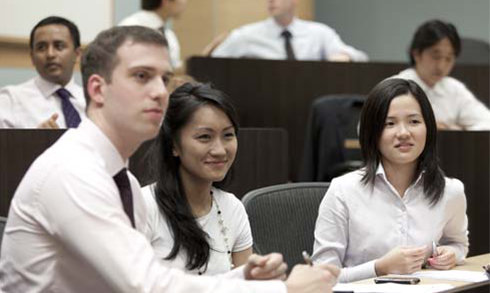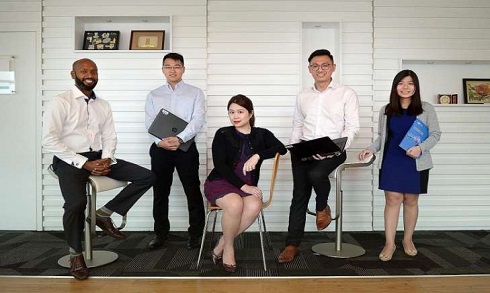A wide range of career opportunities are offered to our graduates. This includes roles in Banking and finance (e.g. Goldman, Credit Suisse, SGX, DBS, Standard Chartered), Government agencies (e.g. Ministry of Finance, MTI, EDB, GIC, IMF), Consulting (e.g. McKinsey, PWC, Bain, Accenture) and Others (e.g. Advertising & Market Research, Education, Logistics, Retail, Healthcare, etc).

At SMU we are committed to holistic admissions, where we look for students who have not only been successful academically but who also possess qualities that we value. Applicants are selected on the basis of their strong academic and co-curricular records as well as evidence of qualities such as positive attitude, intellectual curiosity, critical thinking and communication skills.

Our tuition fees are highly subsidised by the Singapore Government in the form of a Tuition Grant administered by the Ministry of Education. This makes studying at SMU affordable.
FINANCIAL AID
SMU has on offer a host of various financial schemes to ensure all deserving students have equal opportunity to gain a tertiary education at SMU. Here are some of the scholarships available for BSc (Econs) students:
As a coordinated and integrated entity, ASEAN is thriving and will continue to experience growth and prosperity.
At SMU, we will equip you with the necessary skills and perspectives – hard knowledge skills, soft people skills, ethics and social responsibility to capitalise on ASEAN’s blossoming opportunities. Your time at SMU will allow you to form firm friendships and budding networks with SMU students from 30 nations. Most of all, this scholarship will grant you the prestige and opportunities that will make you an invaluable asset in the global economy.
This Scholarship is open to citizens from ASEAN countries* (excluding Singapore citizens) *ASEAN countries comprise Brunei, Cambodia, Indonesia, Laos, Myanmar, Philippines, Malaysia, Singapore, Thailand and Vietnam.
Made possible by a generous gift from the Lee Foundation, the Lee Kong Chian Scholars’ Programme is one of our most prestigious scholarships offering high-calibre individuals the exciting opportunities to a holistic, intellectual and entrepreneurial development.
LKCSP scholars can look forward to a full four-year tuition fee waiver, a one-off notebook grant, annual living allowance, and sponsorship for global opportunities.
Our dedicated Centre for Scholars’ Development (CSD) implements and oversees development programmes for our LKCSP scholars and is committed to guide and to develop the intellectual and holistic growth of our scholars.
Up to 60 scholarships are awarded each year.
The SMU Global Impact Scholarship Award is a premier flagship scholars’ award that is dedicated to nurture a new generation of leaders, committed to helping to solve complex global and local challenges, thus making an impact on society.
The SMU Global Impact Scholarship Award is designed to help realise each scholar’s leadership potential, ignite the desire and hone the ability to make meaningful impact on society. The programme will provide a transformative learning experience that will nurture and hone the scholars’ capacity for:
- Critical, creative and innovative thinking
- A global mindset
- Leadership
- Social responsibility
- Commitment to excellence
In short, the SMU Global Impact Scholarship Award seeks to develop action leaders with a global perspective for the public, private and people sectors.
The new SMU Merit Scholarship Programme opens doors to an enriching and exciting learning opportunity that will broaden your horizons and groom you into an inspiring and impactful leader of the future.
Enjoy the flexibility of a single or double degree, with a generous package that includes a full four-year tuition fee waiver and growth opportunities allowance.
Our dedicated Centre for Scholars’ Development (CSD) implements and oversees development programmes for our scholars and is committed to guide and to develop the intellectual and holistic growth of our scholars.
Up to 35 SMU Merit Scholarships are awarded each year.
Supported by funds contributed by the School's faculty/staff and its fundraising activities, the objective of SOE Scholarship is to motivate and spur students in the School of Economics to achieve greater heights of academic excellence.
Click here for more details and a comprehensive list of more scholarships and awards programmes.
Special Acknowledgement:
The School of Economics will also like to take this opportunity to acknowledge Ms Claire Chiang for her sponsorship for the Claire Chiang Scholarship. The Claire Chiang Scholarship was offered to SOE students with outstanding academic results and strong leadership potential who were also active in community service. One Scholarship was awarded annually and was tenable for one year.
The BSc (Econ) programme is a full-time four-year direct meritorious programme. Students may be able to complete the programme in less time through the granting of credits or course exemptions or fast-tracking by taking more courses during the regular terms or during summer terms.
On average, students read 4 to 5 courses in a regular term. Students on good academic standing can enrol up to a maximum of 5.5 course units (CUs).
No, the BSc (Econ) programme is a full-time programme.
Eligibility for exemptions will be assessed by the Dean's Office after an applicant receives an offer of admission into SMU and accepts the offer. Successful applicants are eligible for exemptions in Calculus and Writing and Reasoning. Depending on their pre-university academic qualifications, students may qualify for exemptions in other curricular components, such as Major Requirements (including Major Core and Major Electives) and Free Electives.
To be eligible for direct entry into the double degree programme, applicants must have excellent academic results.
Freshmen who are offered direct entry into the double degree programme are deemed to be provisionally enrolled. Provisionally enrolled students will be required to fulfil the stipulated double degree requirements by the end of their Year 2, failing which they will be asked to withdraw from the double degree programme and pursue a single degree. Therefore, direct entry does not guarantee enrolment as a double degree student for the duration of the studies at SMU.
Subject to availability of double degree places, freshmen who are not offered direct entry into the double degree programme may enrol as single degree students and will be eligible to apply for the double degree programme at the end of their first or second year if they have done well in SMU and fulfil stipulated course and GPA requirements.
Students aspiring to do a double degree at the School of Law must be offered admission into the Law programme. Admission into the double degree programme will be decided by the School of Law.
The expected duration is 4 years for non-Law double degree students. Law students who are enrolled in a double degree programme can expect to complete the programme in 5 years.
All students must declare their first as well as second (if any) major or major with track within their first 4 regular terms of study (inclusive of term on leave of absence and/or external study programme such as international exchange programme).
BAcc, BSc (Econ), BSc (IS) and LLB students automatically have Accounting, Economics, Information Systems and Law as their first Major respectively. They do not need to make a first major declaration.
SMU SOE offers a Bachelor of Science degree in Economics while NUS and NTU offer degrees in Bachelor of Arts and Bachelor of Social Sciences (Hons) in Economics and Bachelor of Arts in Economics (Hons) respectively.
SOE’s Economics degree programme is designed to provide a strong understanding of modern economic theory, inculcate independent thought about economic policies and problems, develop the capacity for quantitative research, and provide descriptive knowledge about the local and global economy. It is broad based, offers flexibility in the choice of subjects, and at the same time, allows the student to pursue Double Degree or Double Major programme.
Minors are not offered but the School offers second majors in Actuarial Science, Data Science and Analytics, and Health Economics and Management. Tracks such as the Quantitative Economics Track and Real Estate Track are available as well.
BSc (Econ) students are required to take 9-10 compulsory Economics Core courses offered by the School of Economics:
Introduction to Statistical Theory
Mathematics for Economics
Microeconomics 1
Microeconomics 2
Macroeconomics 1
Macroeconomics 2
Introduction to Econometrics
Economic Development in Asia
International Economics or International Trade AND International Macroeconomics
The School also offers electives such as Game Theory, Labour Economics, Data Science with R, Development Economics, Economics of Ageing, Health Economics, Public Sector Economics, Real Estate Economics, Statistical Inference for Data Science, Urban Economics and Policy, etc.
SMU students who have completed at least one year of study and have obtained a cumulative GPA of 2.00 can participate in exchange programmes and be granted approval to transfer credits from approved institutions back to SMU. Such approvals must be obtained before students embark on these external study programmes, which include:
- International Exchange Programmes
- Local Exchange Programmes
- Summer Study Programmes
- Other External Study Programmes (non-exchange and self-arranged by students)
Students will not be allowed to go for any external study programmes in their final term of coursework.
Students must complete a minimum of 10 weeks of internship during their course of study as part of their graduation requirements.
The Dato’ Kho Hui Meng Career Centre (DKHMCC) manages all internship placements for students at SMU. The centre maintains a searchable database, OnTRAC II, of internship listings covering virtually every career field. Students can access this database to apply for internship positions sourced by DKHMCC staff.
Students may also create their own internship experience through their personal networks or prospecting for opportunities directly by writing into organisations for an internship opportunity.
Our Economics degree programme is designed to provide a strong understanding of modern economic theory, inculcate independent thought about economic policies and problems, develop the capacity for quantitative research, and provide descriptive knowledge about the local and global economy.
Beyond the conventional economics curriculum, we offer you the flexibility to specialize in the Quantitative Economics Track (QET) that will give you a competitive career edge in the industry.
The BSc (Econ) is a full-time four-year direct meritorious honours programme. Students will need to complete 36 courses, an internship and a community service programme.
The distinctive features of BSC Economics are:
- The BSc (Econ) programme is broad based, offers flexibility in the choice of subjects, and at the same time, allows the student to major in Economics or double major in other fields.
- The double major in Economics and Finance programme is especially attractive to students who wish to build a career in the financial sector. Moreover, further reflecting the synergy between the various SMU degree programmes, students are able to enrol for double degree programmes in Economics and Business, or Economics and Accountancy.
- Students who wish to graduate with Honours are required to complete a Senior Thesis Seminar course, which is equivalent to two course units.
- Each student can choose his/her courses according to his/her preferred interests and pace. In order to cater for this flexibility, a wide variety of courses are offered in each subject areas. On average, students read 4 to 5 courses per term. Each student must read at least 1 course unit and not more than 5.5 course units per term.
- The BSc (Econ) is a full-time four-year direct meritorious honours programme. However, many students can expect to complete the programme in less than 4 years with Advanced Standing or fast-tracking by taking some courses in Term 3 of the academic year. Students with advanced standing may be granted credits of up to six courses.
- Classes are deliberately kept small, averaging 40 students each. Students are assessed continuously through class participation, assignments, projects and examinations.
- The school adopts the American GPA (Grade Point Average) system for grading. On successful completion of the BSc (Econ) programme, students will be awarded the BSc degree accordingly, depending on their overall performance:
- BSc (Econ) cum laude (with honours),
- BSc (Econ) magna cum laude (with high honours) or
- BSc (Econ) summa cum laude (with highest honours).
STRONG EMPLOYMENT OUTCOMES
SMU graduates embody the balanced combination of hard knowledge skills and soft people skills. More than 83% of fresh graduates from the 2021 cohort are employed within six months of final examinations*.
Our cutting edge education prepares our graduates well for careers related to banking and finance, insurance, real estate, consultancy and research, as well as planning and policy making.
IMPECCABLE EMPLOYMENT RECORDS

CAREER HEADSTART
Our cutting edge education prepares our graduates well for careers related to banking and finance, insurance, real estate, consultancy and research, as well as planning and policy making. SMU students are known for being bold, confident and articulate. They take the initiative, think out of the box and assume leadership and responsibility for what they do.

HIGHLY SOUGHT-AFTER BY EMPLOYERS
At SMU, we take full interest in preparing you for the real world. We mould you to become credible and knowledgeable professionals, whose services are in demand. Studying in SMU doesn't only open your mind. It opens doors.

GRADUATE EMPLOYMENT SURVEY
SMU graduates embody the balanced combination of hard knowledge skills and soft people skills. More than 83% of fresh graduates from the 2021 cohort are employed within six months of final examinations. Click here to read more.

CAREER ENRICHMENT PROGRAMMES
Our dedicated Dato’ Kho Hui Meng Career Centre has pioneered many programmes, like our dynamic “The Finishing Touch” courses and workshops, to help give the edge in job interviews and fast-track your career.
DIVERSE CAREER OPTIONS
A Sample of Various Career Paths of SMU Bachelor of Economics Graduates
Actuary
Data Analyst
Economist
Enterpreneur
Financial Consultant
Investment Analyst
Management Consultant
Market Researcher
Ship Broker
Trader
Research Associate
- Banking and Finance
- Communications
- Consulting
- IT
- Manufacturing
- Media
- Public Sector
- Real Estate
- Retail
- Shipping
- Goldman Sachs
- Credit Suisse
- Singapore Stock Exchange
- Development Bank of Singapore
- Citibank
- McKinsey
- PricewaterhouseCoopers
- Bain
- Accenture
- Ministry of Finance
- Monetary Authority of Singapore
- Ministry of Health
- Ministry of Trade and Industry
- Singapore Economic Development Board
- Columbia University
- London School of Economics and Political Science
- New York University
- Northwestern University
- Oxford University
- University of Michigan
- University of Minnesota
- University of Pennsylvania – Wharton School
- University of Southern California
- University of Washington
Career Prospects
Civil Aviation Authority of Singapore | Graduate Student, UC Berkeley (on study leave from the Civil Aviation Authority of Singapore)

Victor Sim
Victor has been involved in various aspects of civil aviation policy over the last decade, with the Civil Aviation Authority of Singapore (CAAS) and the Singapore Ministry of Transport. These include air hub development, airport capacity, airspace and airline competition issues. In 2017, Victor was awarded a postgraduate scholarship by CAAS to study at the Goldman School of Public Policy, University of California Berkeley.
Hepmil Media Group | CEO and Co-Founder

Karl Mak
The Hepmil Media Group runs popular digital content platforms - SGAG and MGAG, viewed by over 10 million across the region weekly. His work has led him to establish strong partnerships with the region’s largest agency networks to co-produce some of the most viral and award winning branded content. Karl was recently named in Forbes Asia’s 30 under 30, class of 2017.
Urban Redevelopment Authority | Director

Yam Yujian
Yujian has been placed in positions to deal with numerous complex and multi-faceted policy issues. He led URA’s Property Research Department between 2014-2017 and is now with URA as a Director.
Sequoia Capital | Director

Goh Di Kun
Di Kun has ten years of experience in Telecoms, Media and Tech (TMT) sector across investment banking and consulting. He is currently a Director at Sequoia Capital.